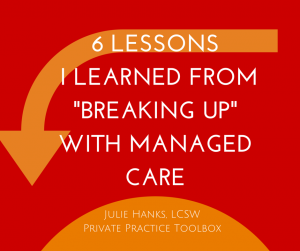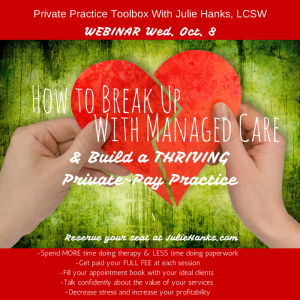 It was a scary step to resign from all insurance panels! I wasn't aware of any therapists who had built a fee-for-service practice in my area. The things I learned in the process of were better than I had expected.
When my practice Wasatch Family Therapy transitioned from managed care panels to a private pay model over a decade ago, I anticipated a few things would happen; I knew that this business decision would help allow me more control over the type and length of therapy, that I would have less paperwork, and I would get paid at the time of service. However, there were some unexpected lessons I learned as well. Here are 6 things I learned from breaking up with managed care:
It was a scary step to resign from all insurance panels! I wasn't aware of any therapists who had built a fee-for-service practice in my area. The things I learned in the process of were better than I had expected.
When my practice Wasatch Family Therapy transitioned from managed care panels to a private pay model over a decade ago, I anticipated a few things would happen; I knew that this business decision would help allow me more control over the type and length of therapy, that I would have less paperwork, and I would get paid at the time of service. However, there were some unexpected lessons I learned as well. Here are 6 things I learned from breaking up with managed care:
I Learned:
- the value of my perceived value.
When potential clients learned that I employed a private pay model, they seemed to perceive me as a more competent provider. "You must be really good if you don't have to be on insurance panels." My clinical skills hadn't changed, but my perceived value went up because of how I presented my services. It's surprising how much the way we clinicians value and present ourselves affect how others see us.
- that I felt more alive in my clinical work.
The stress of constant paper work and phone calls that was part of being on managed care panels unfortunately led me to resent the work I was doing. However, after transitioning to a private pay model, I could refocus my energy on the reason I went into the mental health profession. Since I no longer felt drained by jumping through hoops for insurance companies, I was able to rediscover my passion and love of doing clinical therapy.
- that I deserved to be compensated well.
The work we do is vitally important, and it's not selfish to desire income stability for yourself as a mental health professional. Resigning from managed care helped reaffirm to me that I do deserve to be well compensated for my clinical services.
- that I had more time and energy for family and other passions.
The income stability, decreased stress, and increased time that a private pay model afforded me meant that I could invest more in my hobbies and in my relationships. I've been able to pursue many of my passions, including songwriting and getting my PhD, and I've cherished the relationships that I've been able to nurture and devote more time to.
- how to present my fees with confidence.
Understandably, a mental health professional transitioning from managed care to private pay may feel some hesitation about talking about his/her service fees. I initially felt this reluctance as well. Few people are confident in talking about money! But, as time went on I learned to overcome this challenge and present my fees and talk about a fee-for-service model with ease (click here for more about how to create and assertively implement a financial policy for your clients).
- how to generously refer to colleagues.
It can be difficult for many clinicians to refer potential clients to other providers. We may feel somewhat of a scarcity mentality, and that if we don't decide to do therapy work with a certain individual there may not be any other clients who want our services. I realized that even if I didn't see a client for therapy, I could still serve him/her by providing referral options. For example, I could identify sliding scale fee clinics in the area or email names of therapists who were on an insurance panel or were in some way a better fit. By doing this, not only was I helping individuals find the care they needed, but I was also helping other colleagues in my community by providing them with more business. Referring to outside sources has been an incredibly important aspect of working with a fee-for-service practice, as Wasatch Family Therapy currently refers at least 50% of our inquiries to other providers in the community.
 Click here for access to the full webinar "How to Break Up With Managed Care and Build a Thriving Private Pay Model."
Click here for access to the full webinar "How to Break Up With Managed Care and Build a Thriving Private Pay Model."
Get practice tips and blog updates in your inbox. Sign up for the Private Practice Toolbox Newsletter here.
Join my Private Practice Toolbox Facebook group and connect with 3100 therapists around the globe in 2 simple steps: 1) Click request to join the group and 2) Fill out this brief questionnaire before you'll be added to the group.

As healers, we genuinely like to do our work. Guiding clients through the therapy process and seeing them make progress is why we do what we do. But if you're in private practice, you know there's a lot going on in the back end and that it's crucial to run an efficient and organized business.